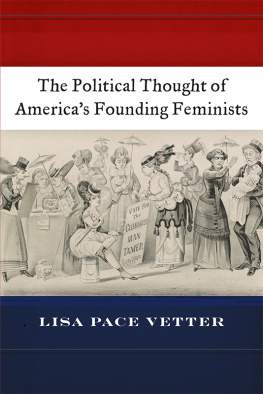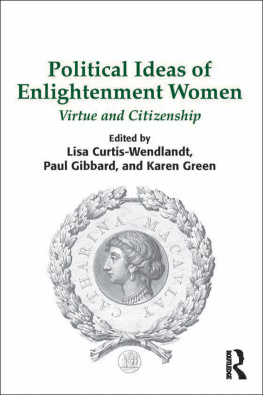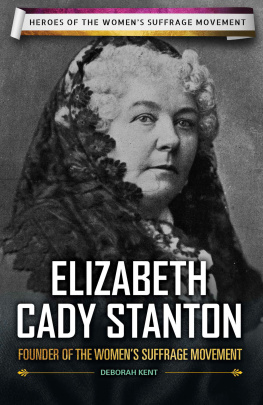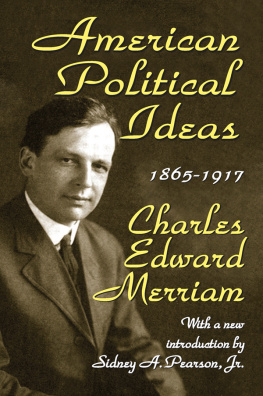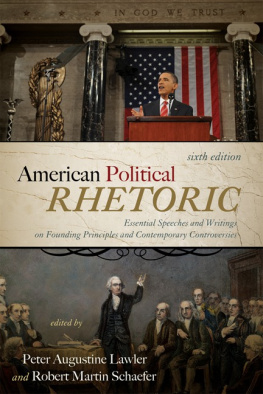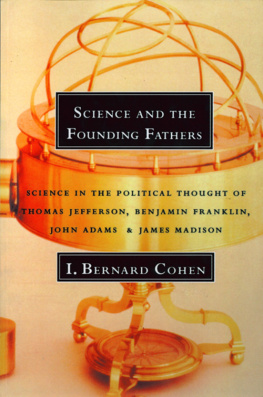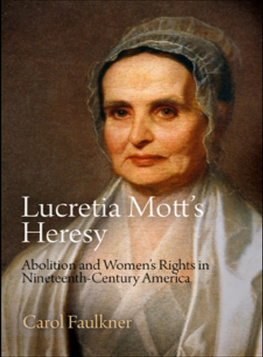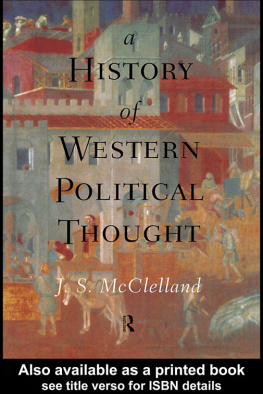The Political Thought of Americas Founding Feminists
The Political Thought of Americas Founding Feminists
Lisa Pace Vetter
NEW YORK UNIVERSITY PRESS
New York
NEW YORK UNIVERSITY PRESS
New York
www.nyupress.org
2017 by New York University
All rights reserved
References to Internet websites (URLs) were accurate at the time of writing. Neither the author nor New York University Press is responsible for URLs that may have expired or changed since the manuscript was prepared.
ISBN : 978-1-4798-5334-2 (hardback)
ISBN : 978-1-4798-9325-6 (paperback)
For Library of Congress Cataloging-in-Publication data, please contact the Library of Congress.
New York University Press books are printed on acid-free paper, and their binding materials are chosen for strength and durability. We strive to use environmentally responsible suppliers and materials to the greatest extent possible in publishing our books.
Manufactured in the United States of America
10 9 8 7 6 5 4 3 2 1
Also available as an ebook
Contents
When I began this book project, I joked that it would take me ten years to write it. Turns out, I was correct. Not surprisingly, I have incurred many debts over that long stretch of time. First and foremost, I thank my husband Joseph Vetter for his unflagging enthusiasm about this project and his unwavering support through some trying times. I am deeply grateful to my University of Maryland, Baltimore County, colleagues Devin Hagerty and Carole McCann for reading the entire manuscript and providing much-needed encouragement. Additional colleagues, including Jeffrey Davis, Carolyn Forestiere, Arthur Johnson, and Thomas Schaller offered helpful advice and support at various stages of the project. Michael Nance graciously invited me to incorporate my research into the UMBC Humanities Seminar we co-taught in Spring 2016. Gracie Bradford provided invaluable teaching and research assistance when I needed it the most. I am deeply thankful to Patricia LaNoue for welcoming me back into the UMBC fold and to Steven McAlpine and Carrie Sauter for being such great colleagues. I thank Mary Dietz for her perseverance in guiding my article on Harriet Martineau to publication in Political Theory and Eileen Hunt Botting for providing me with opportunities to present and publish parts of this project.
I received several awards that allowed me to perform archival research and devote myself full time to writing at crucial stages of the project: a UMBC Dresher Center Summer Faculty Research Fellowship; a UMBC Summer Faculty Fellowship; a UMBC Travel Grant; a Caroline D. Bain Scholar-in-Residence Fellowship, Sophia Smith Collection, Smith College; and a National Endowment for the Humanities Summer Research Stipend. Sincere thanks to Jessica Berman, director, Dresher Center for the Humanities, UMBC, and Scott Casper, dean, College of Arts, Humanities, and Social Sciences, UMBC, for their support. For their invaluable assistance, I thank Margaret Jessup, assistant curator of the Sophia Smith Collection, Smith College; Christopher Densmore, curator of Friends Historical Library, Swarthmore College; and the research staff at the Boston Public Library and the Nantucket Historical Society.
It has been a true pleasure to work with Ilene Kalish, executive editor, and Caelyn Cobb, assistant editor, at NYU Press. I appreciate their encouragement and enthusiasm for the project. The comments provided by two anonymous reviewers were very helpful as I revised the final version of the manuscript.
It takes a village to write a bookor at least it did mine. I thank my parents, Madge Pace and Cecil Pace, for always having faith in me and my in-laws David Vetter, Carole Vetter, and Neil Van Valkenburgh, for their generosity. The comradery of the Bethesda Edge(moor) Cycling Club ladies group, led by Sue Hendrickson, has often buoyed my spirits, and I am grateful to Kevin Beverly for introducing me. And our recently adopted dog Paulie has provided welcome distraction, refusing to believe that writing a book is more important than a game of fetch.
An earlier version of chapter 2 was published as Harriet Martineau on the Theory and Practice of Democracy in America, Political Theory 36, no. 3 (June 2008): 424455. Reprinted by permission of the author and the publisher.
An earlier version of chapter 5 was published as The Most Belligerent Non-Resistant: Lucretia Mott on Womens Rights, Political Theory 43, no. 5 (October 2015): 600630. Reprinted by permission of the author and the publisher.
Citations to Adam Smiths works are to the Glasgow edition published in hardcover by Oxford University Press and paperback by the Liberty Fund. Passages are referenced using the Glasgow editions standard system of paragraph numbering and take the following abbreviations. Original spelling, capitalization, and punctuation have been maintained from the texts.
LRBL: Bryce, J. C., ed. Lectures on Rhetoric and Belles Lettres. Indianapolis: Liberty Fund, 1985.
TMS: Raphael, D. D., and A. L. Macfie, eds. The Theory of Moral Sentiments. Indianapolis: Liberty Fund, 1982.
WN: Campbell, R. H., A. S. Skinner, and W. B. Todd, eds. An Inquiry into the Nature and Causes of the Wealth of Nations. Indianapolis: Liberty Fund, 1981.
The works of the early womens rights advocates and abolitionists that are cited in this book have been taken from collected editions, many of which include transcriptions that maintain the spelling and punctuation of the original documents. I have reproduced these passages as they appear in the collected editions and follow their editorial practices.
Political Theory and the Founding of American Feminism
In his second inaugural address, President Barack Obama made history with the following declaration:
Our journey is not complete until our gay brothers and sisters are treated like anyone else under the law, for if we are truly created equal, then surely the love we commit to one another must be equal as well.
Obama was the first sitting president to mentionlet alone endorsegay marriage in such a historic context, a fact widely noted in contemporary accounts of the address. Yet in the same speech, Obama did another remarkable thing by connecting Stonewall, the bar that became the center of 1969 protests for gay rights in New Yorks Greenwich Village, to Seneca Falls, New York; Selma, Alabama; and the National Mall, site of the 1963 March on Washingtonlandmarks where generations of Americans were guided by the star that is the belief that all men are created equal. This would not be the first time Obama would portray these pivotal events as a constellation of reforms to advance equal rights for marginalized populations, including women, African Americans, and homosexuals, which in his view were necessary to make America a more perfect Union.
Adding to the distinctive nature of Obamas view of history is that it connects disparate actors who contributed to American history in various waysmany of whom are relatively unknown or have languished in obscurity. Again alluding to the deep bond between womens rights, civil rights, and gay rights in the second inaugural speech, Obama states that our journey is not complete until our wives, our mothers and daughters can earn a living equal to their efforts.
Obama would also devise an understanding of American exceptionalism that is fundamentally rooted in constant political transformation, For we were born of change. We should not rest on our laurels, but rather we should revere Americas ability to subject itself to intensive self-scrutiny for the sake of improvement and its continuing awareness of its own imperfections and limitations:

